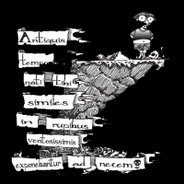The Pantheon of Super-Heroes, Part One
 I've actually been stewing on this article for a good part of a month now, and I felt it made a good launching point for Boom Boom, a column that's going to come at you every Monday, for no apparent reason other than to help you speed up your countdown to the next episode of [insert favorite geeky show here.]
I've actually been stewing on this article for a good part of a month now, and I felt it made a good launching point for Boom Boom, a column that's going to come at you every Monday, for no apparent reason other than to help you speed up your countdown to the next episode of [insert favorite geeky show here.]
I don't think it's any huge spoiler if I say, at this point, that Captain America is dead. You have to be nearly living under a rock at this point to have missed out on that fact. Much like the death of Superman in the nineties (you remember the nineties, kids? Eddie Vedder? We wore plaid? Thought boy bands were the way to go) if you have missed out on the fact that Captain America is dead, then you probably didn't know who he was anyway, or are reading this blog.
I have been happily reading comics for most of my life now. Since I was a wee tot, whom nobody called wee tot, I've been reading all sorts of comics. I can still remember all sorts of storylines very vividly, because when you're young they have an effect on you, and it's an emotional one. You're not yet at that age where you're thinking Ah, smart publicity move on the part of DC to kill Superman, but of course we know he won't stay dead, I hope they don't screw up the return too badly. When you're young and you've got wide eyes and a big imagination, comic books fill you up. I still remember that Superman died, and I was a heartbroken young man, and then shortly thereafter Bane broke Batman's back (in the classic Knightfall series). I was one seriously messed up kid. These were my idols they were screwing with.
Batman recovered. Superman came back to life. It didn't lessen the emotional impact, and it didn't change how I had been made to feel. I've carried that with me a lot of years. Even now, I have the Death and Return of Superman in dusty, battered volumes on my shelves, and I can read them and still feel the emotions. They may just be old echoes, but I remember them.
It was just as big a deal when Hal Jordan stopped being the Green Lantern, when Wally West and Barry Allen (the Flashes) squared off.
Big deals, when you're young.
So, fast forward a bunch of years. I drifted away from comics during parts of the nineties. Recently, I came into a hundred and fifty comics from someone's collection, most of them comics from that weird period in the nineties when the Hulk was calm and cool and wore shirts (?), when someone thought X-Men: 2099 was a good idea (??) and when Superman had a mullet (!?). I re-read a lot of them and I remembered most of the stories, because while I'd been reading them, I hadn't been paying close attention. There was nothing to pay close attention to. The stories were outlandish and absolutely off the wall. Which I do fully expect from Super-Heroes (like Superman and Doomsday squaring off wasn't outlandish). I adore it, when done well. During the nineties, it was like the decline of hair metal. When something inflates too big, it either deflates slowly, or it pops. Either way, it goes down. Comics, and hair metal, popped.
Through all of this, I've read Captain America. Even when he really stunk (and sometimes, he really...really did). I liked Captain America. I thought he was the strongest (willed) character in the Marvel Universe. Comparable to Batman in the DC universe. In many ways, the antitheses of Batman. I followed him through his phases as U.S. Agent, and just Steve Rogers, and The Captain, all of it. I adored him. Throughout everything else that I faded reading, or stopped reading, the comics I always stuck with were simple: 1) Captain America 2) Iron Man 3) Green Lantern.
reading, the comics I always stuck with were simple: 1) Captain America 2) Iron Man 3) Green Lantern.
I cannot imagine what the younger me would have felt, when reaching the end of the issue of Captain America where he's lying on the steps, bloody and listless. Steve Rogers, dead. I know what the older me felt, and there was definite emotion. I joked that it bothered me, and then gradually came to realize that actually, it really did bother me. After he died, I bought Marvel: Ultimate Alliance for the PS2, and have mostly just played as Captain America in all his various costumes. It made me sad. It really did. You can make fun of me for that if you want, but you're reading the blog on a sci-fi magazine web-site, and I bet you cried during the Ewok song in Return of the Jedi, so let's just respect our geekdoms, 'kay?
(An aside: I'm now finding it impossible to read things like The Initiative comics, where we follow Iron Man's new teams, and Iron Man himself. It's like reading how the Nazis won, and then we have to root for them. Iron Man is in danger, and I realize that I absolutely don't care. I really feel like the bad guys won.)
How it affected you, I will make no effort to guess. Maybe it didn't. Maybe it did. I can only talk about how it affected me. More importantly, why.
It's not that the writing was always great on Captain America (or on any comic; it's never consistently great). Sometimes, it was downright awful. The unique thing about ongoing series like Captain America, or any comic character, is that good or bad, you follow them from issue to issue, from month to month, from year to year, onward and onward. They never grow old, they die and are reborn, they fight, they are beaten, they get back up and fight again, and through it all, you read.
The ultimate power of comics is not always in powerful writing, although powerful writing understands this connection and magnifies it to great effect. The ultimate power of comics is that even if it's a bad storyline, you read and you care, because if you've been following the character for a year, six years, twenty years, you're as invested in him as you are in your family pet, or your favorite comic strip in the newspaper.
Every few years, they try to reboot comics, because they are ever aware of the oppressive history that bears down on them. They are afraid that new readers will not come into a storyline which has forty years of history behind it, and in many ways, they're right.
But in doing so, they fail to realize that their success still depends on appealing to the readers who have followed them for so long. Ultimate Spider-Man and Ultimate X-Men both worked (at first, never mind now) because we looked at a young and learning Peter Parker and we were, in many ways, nostalgic. Likewise, the X-Men. Eventually, the storylines gather their own weight and mostly we drift back to just reading what we read before. Whatever Spider-Man you happen to like.
History is the second most important component to a super-hero comic book. They (the creators) worry about the oppressive weight of a comic bearing down on the reader, without always realizing that it's history which garners the appeal. Some readers, myself included, like coming into something that has 5oo back issues. For one thing, it means if I am really stunned with what Joe Straczynski is doing on Spider-Man, I can go back and read my way through piles of back comics in between new issues. I can get lost in a world of Spider-Man. Sometimes silly, sometimes horrible, always Spider-Man, always the same world I willingly chose to immerse myself in.
It's the writer's biggest tool, and as I said, the second most important component in hero comic books.
For the first, I'll tell you about it next Monday.




2 comments:
I haven't read far enough to really know about Cap's death, and I'm not certain about how he died (although I think I know how The Civil War was setting it up), but I know he died, and I'm heartbroken. He wasn't some lame flagged-wrapped piece of American nostalgia, he represented an almost libertarian freedom and I'm really bummed to see that freedom bite the dust. I know, I know, he's a cartoon, and I'm an almost forty-year old man, but I agree with you Pete, When these characters die, it makes me evaluate my own life, and reminisce about my own childhood.
When Cap comes back I hope he spits in the eyes of fools for my kids like he often did for me, and if he has to die again for the cause of real liberty, then I'll be bummed all over again, and happy to count myself among the few people who has the luxury of worrying about dead comic-book heroes, and not about how my family will eat.
My favorite Captain America moment was in Spider-Man #35 (#36?) by Joe Straczynski, in which Spider-Man reaches the World Trade Center site just a few minutes after the second tower collapsed.
Not only is it one of the most powerful and stunning Spider-Man issues, but it has a scene when Spider-Man sees Captain America, just standing on some rubble, looking out at the destruction. He's not crying. He's just wide-eyed. Just...staring.
Spider Man thinks, "He lived through this once. I can't imagine how he lives through it again. I couldn't do it."
I read it only yesterday. It broke my heart, but Steve Rogers broke it even MORE gooder.
Post a Comment